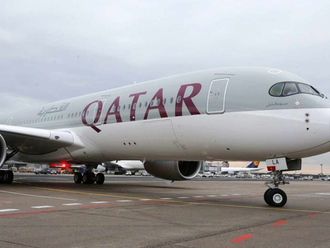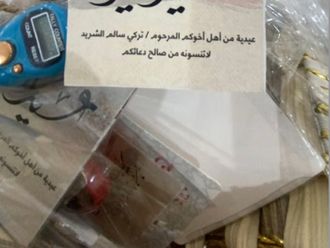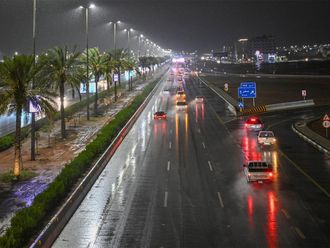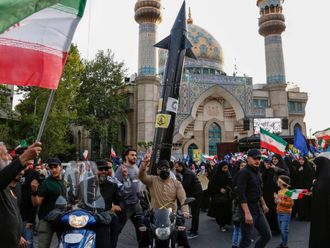Doha: Qatar helped resolve a hostage crisis in Syria’s civil war in a rare instance of cooperation between Damascus and its foes, providing a boost for the Gulf Arab nation’s efforts to restore its role as regional mediator.
Qatar’s diplomatic intervention prompted Syrian rebels to release nine Lebanese hostages in exchange for the liberty of two Turkish Airlines pilots and about 100 female prisoners, said governments involved and other regional officials.
The crisis began 17 months ago, when the Syrian rebels detained the Lebanese men, accusing them of being Hezbollah operatives who were backing the Syrian government. Soon after, a Lebanese group kidnapped the Turkish pilots to pressure the rebels to release what the group said were religious pilgrims. The female prisoners were held by Syria’s government.
To end the crisis, Lebanese officials say Qatar’s new foreign minister, Khalid Al Attiyah, negotiated directly with Syrian officials, the first known contact between the two sides since Qatar split with the regime in Damascus at the start of Syria’s conflict 29 months ago.
Underlying Qatar’s role in brokering the deal between Syria, Lebanon and Turkey, two Qatar Airways jets simultaneously shuttled abductees to Istanbul and Beirut on Saturday night, where they were met with jubilant celebrations. Qatar’s foreign ministry didn’t return calls seeking comment.
The Gulf state’s role in the hostage release came as the Arab League on Sunday set another round of peace talks between the Syrian government and the opposition starting on November 23 in Geneva. International diplomats hope the talks can build on Syria’s deal last month to yield its chemical weapons under to United Nations guidance, but it wasn’t clear on Sunday who would attend.
Diplomats say Qatar’s diplomacy doesn’t mean that it has changed its policy of supporting rebel efforts to dislodge President Bashar Al Assad. But they agree it is trying to reassert itself as a broker on the world stage after a rocky period.
Before 2011, Qatar racked up several diplomatic victories in the Middle East, propelling the tiny Gulf state into a regional juggernaut. It helped reconcile warring Palestinian political parties and helped rebuild Lebanon after the 2008 Israeli invasion.
But since the Arab Spring began in 2011, Qatar’s standing among its neighbors has deteriorated. It has failed to unite Syrian rebel factions, despite its generous financial aid, and it was powerless to prevent Egypt’s army from overthrowing the Muslim Brotherhood-backed government in Cairo — a key Qatari ally — this summer.
The rough outlines of the current diplomatic coup began in June, when Qatar’s emir, Shaikh Hamad Bin Khalifa Al Thani, retired and handed power to his son Shaikh Tamim Bin Hamad Al Thani.
Completely different policy
The resignation let him force the retirement of Qatar’s former foreign minister, a move US and Lebanese officials said showed a desire to alter its Syria policy, while saving face with a powerful branch of the ruling family. The former minister supported more extremist elements of Syria’s rebels against the emir’s wishes, the US officials said.
“There’s no doubt in my mind that the new emir has a completely different policy from his father and already started to show it in terms of movement on the field [after] supporting militias in Syria,” said a Lebanese official with knowledge of the hostage release, adding that the new emir is trying to normalise regional relations.
Some diplomats said Qatar may also be trying to show Washington that it can influence radical elements within the fragmented Syrian rebel movement. Other diplomats said Qatar may be seeking to further its reputation as a neutral arbiter with Iran, the key Al Assad ally that is now negotiating over its nuclear programme with Western powers.
The hostage crisis also provided Qatar with an opportunity to mend relations with Syria’s government and Damascus’s ally Hezbollah, some diplomats said. The two split after the start of the Syrian conflict.
The hostage talks began months ago, but gained urgency in recent weeks over international concerns that the hostages would fall into the hands of Al Qaida’s affiliate in Syria, the Islamic State of Iraq and Al Sham, or ISIS. The secular rebels who seized the Lebanese Shiite Muslims last year, the Northern Storm Brigade, are now clashing with ISIS in Syria.
“It’s a critical situation there at the moment and [ISIS] is moving in,” said a senior Lebanese security official.
Qatar’s move could also reflect growing worries over the rise of extremists among Syria’s rebel ranks, a development that Qatar’s regional rivals say it fosters. Qatari officials deny any support for Islamist extremists.
One hostage told a local TV station: “We paid a high price.”











